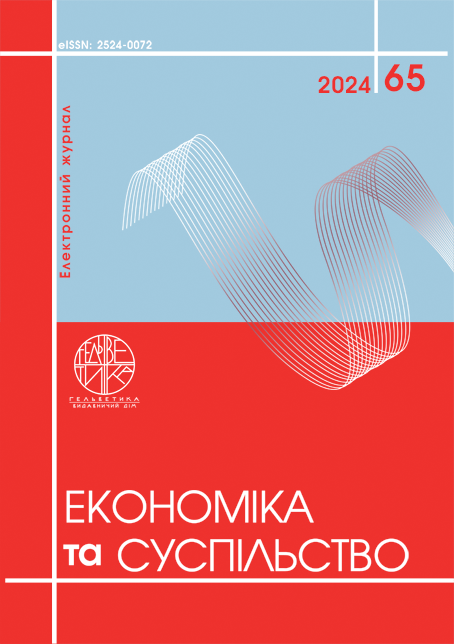MODELS OF INTERACTION BETWEEN THE AUTHORITIES AND CIVIL SOCIETY IN THE COUNTRIES OF THE EUROPEAN UNION
Abstract
The topicality of the topic is determined by the need to study and borrow European experience for the improvement of public administration and the development of civil society in Ukraine. The purpose of the article is to research models of interaction between the authorities and civil society in the countries of the European Union. Considering their impact on increasing the efficiency of management, the transparency of state institutions and the participation of citizens in decision-making processes. The study examines key models of interaction, such as partnerships, consultation mechanisms and public control mechanisms, as well as their practical implementation in different EU countries. The main models of interaction developed and used in EU countries: corporatist model, pluralistic model, institutional model, Mediterranean model, Scandinavian model, French model, Central and Eastern European model. Special attention is paid to the advantages and challenges arising from the implementation of these models. Attention is focused on the importance of adapting European experience to the specific conditions of Ukraine, particularly in the context of modern political and social challenges. It is highlighted how effective models of interaction can contribute to the development of democratic processes, strengthening trust in the authorities and improving management in crisis conditions. The results of the study can be useful for the development of strategies for the interaction of the state and civil society in Ukraine, in particular in the conditions of post-war reconstruction. Because the introduction of European models of interaction can not only contribute to the recovery of the country, but also become an important step on the way to deeper democratization and strengthening of civil society institutions.
References
Models to Promote Cooperation between Civil Society and Public Authorities: International Center for Not-for-Profit Law (ICNL). URL: https://www.icnl.org/wp-content/uploads/cfr_Models-to-Promote-Cooperation-Working-Paper.pdf (дата звернення: 19.08.2024 р.).
Divjak T., Forbici G. The future evolution of civil society in the European Union by 203. European Union: Visits and Publications. 2017. 59 р. URL: https://www.eesc.europa.eu/sites/default/files/files/the_future_evolution_of _civil_society_in_the_eu_by_2030.pdf (дата звернення: 19.08.2024 р.).
Keijzer N., Bossuyt F. Partnership on paper, pragmatism on the ground: the European Union’s engagement with civil society organisations. Development in Practice. 2020. Vol. 30. Рр. 784–794. URL: https://www.tandfonline.com/doi/full/10.1080/09614524.2020.1801589#abstract (дата звернення: 19.08.2024 р.).
Лізаковська С. В. Європейські стандарти взаємодії органів публічної влади з інститутами громадянського суспільства. Public Administration and Regional Development. 2020. №8 С. 422–444. URL: https://pard.mk.ua/index.php/journal/article/view/186/150 (дата звернення: 19.08.2024 р.).
Dynnyk I. Mechanisms of interaction between the state and civil society in the conditions of decentralization: the experience of CEE countries for Ukraine. The formation and peculiarities of the implementation of the European Union’s Eastern policy: Scientific monograph [science eds. T. Astramovich-Leik, Ya. Turchyn]. Riga, Latvia : Baltija Publishing, 2022. 110–123. URL: http://baltijapublishing.lv/omp/index.php/bp/catalog/download/246/6934/14440-1?inline=1 (дата звернення: 19.08.2024 р.).
Models to Promote Cooperation between Civil Society and Public Authorities: International Center for Not-for-Profit Law (ICNL). URL: https://www.icnl.org/wp-content/uploads/cfr_Models-to-Promote-Cooperation-Working-Paper.pdf (дата звернення: 19.08.2024 р.).
Divjak T., Forbici G. The future evolution of civil society in the European Union by 203. European Union: Visits and Publications. 2017. 59 р. URL: https://www.eesc.europa.eu/sites/default/files/files/the_future_evolution_of _civil_society_in_the_eu_by_2030.pdf (дата звернення: 19.08.2024 р.).
Keijzer N., Bossuyt F. Partnership on paper, pragmatism on the ground: the European Union’s engagement with civil society organisations. Development in Practice. 2020. Vol. 30. Рр. 784–794. URL: https://www.tandfonline.com/doi/full/10.1080/09614524.2020.1801589#abstract (дата звернення: 19.08.2024 р.).
Lizakovska S. V. (2020). Yevropeiski standarty vzaiemodii orhaniv publichnoi vlady z instytutamy hromadianskoho suspilstva [European standards of interaction between public authorities and institutions of civil society]. Public Administration and Regional Development, 8, pp. 422–444. Available at: https://pard.mk.ua/index.php/journal/article/view/186/150 (accessed August 19, 2024).
Dynnyk I. Mechanisms of interaction between the state and civil society in the conditions of decentralization: the experience of CEE countries for Ukraine. The formation and peculiarities of the implementation of the European Union’s Eastern policy: Scientific monograph [science eds. T. Astramovich-Leik, Ya. Turchyn]. Riga, Latvia : Baltija Publishing, 2022. 110–123. URL: http://baltijapublishing.lv/omp/index.php/bp/catalog/download/246/6934/14440-1?inline=1 (дата звернення: 19.08.2024 р.).

This work is licensed under a Creative Commons Attribution 4.0 International License.


